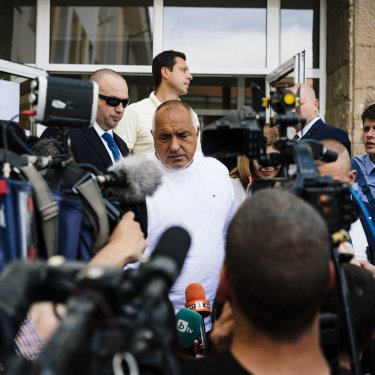Bulgarian journalists threatened, mocked by top officials

Reporters Without Borders (RSF) calls on the Bulgarian authorities to stop trying to intimidate the country's journalists, who have been subjected to a series of verbal attacks and threats by very senior officials since the start of the month.
They include Prime Minister Boyko Borisov, who likened journalists, especially women journalists, to turkeys during a press conference in Sofia on 4 February and then, in a surreal attempt to mock them, tried to imitate the gobbling of a turkey for several seconds, ignoring the protests of the journalists present.
At a press conference in Brussels the next day, prosecutor-general Ivan Geshev turned on Atanas Tchobanov, the editor of the investigative news website Bivol. Instead of responding to Tchobanov’s questions, Geshev started putting questions to Tchobanov that showed he had information about his private life. Articles published by Bivol have suggested that Geshev has been involved in questionable transactions. Tchobanov was described as a “little provocateur” by Bulgarian MEP Alexander Yordanov when Tchobanov asked him a about a case of corruption in which one of his colleagues was allegedly involved. It was the Bulgarian prosecutor’s office that posted these verbal exchanges on YouTube.
On 11 February, Bulgarian national assembly deputy speaker Valery Simeonov accused two journalists with the commercial TV channel bTV, Venelin Petkov and Anton Hekimyan, of being “corrupt” and asked the prosecutor’s office to investigate them for failing to report alleged links between the online casino Efbet’s owner and Vasil Bozhkov, a businessmen recently arrested on 11 charges. Defending its two journalists, the bTV Media Group responded that “the journalist’s role is to report the truth after verifying and investigating.”
“It is distressing to see that personal and offensive attacks against journalists by the most senior officials in Bulgaria are not isolated and keep on occurring,” said Pauline Adès-Mevel, RSF editor-in-chief. “The European Union cannot allow journalists to be threatened in such an institutional and systematic manner in a member country. We ask the European Parliament’s president to clearly condemn these disgraceful attacks.”
Bulgaria has been experiencing a serious media crisis for the past decade because many media outlets are owned by just a few oligarchs and journalists are constantly subjected to harassment. RSF already voiced alarm about the situation in a 2018 report on investigative journalism in Bulgaria but nothing seems to have improved. Ranked 35th in RSF’s World Press Freedom Index in 2006, Bulgaria is now ranked 111th, the lowest ranking of any EU member country.



